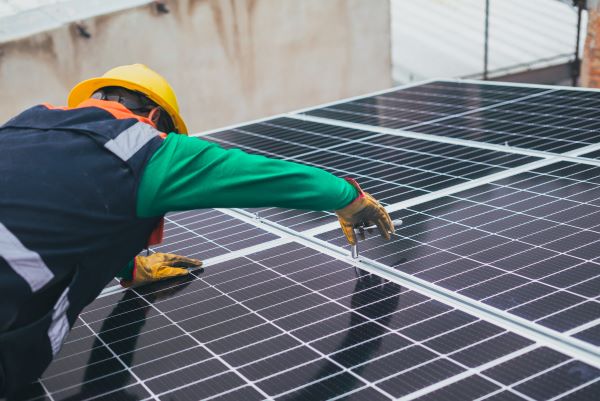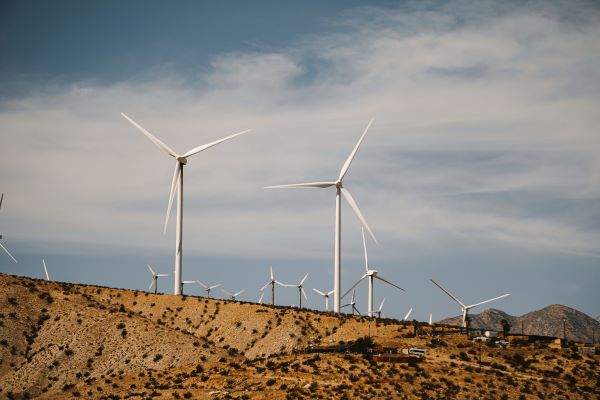
The Rise of Green Energy Jobs in the Renewable Energy Sector
23 Nov, 20235
Contents
- Understanding the Green Energy Sector
- What Constitutes Green Energy?
- The Evolution of Renewable Energy Technologies
- The Current Landscape of Green Energy Employment
- Geographical Hotspots for Green Energy Jobs
- The Role of Government Policies in Job Creation
- Types of Jobs in the Renewable Energy Sector
- Engineering and Technical Positions
- Project Management and Development Roles
- Sales, Marketing, and Customer Service in Green Energy
- Skills and Qualifications for a Career in Green Energy
- Educational Pathways and Certifications
- Necessary Technical and Soft Skills
- Economic Impact of Green Energy Job Growth
- Contribution to National and Global Economies
- The Effect on Local Communities
The renewable energy sector has been experiencing significant growth in recent years, leading to a rise in green energy jobs. This shift towards sustainable energy sources has not only paved the way for a greener future but has also created diverse opportunities for employment. Understanding the dynamics of this evolving industry is essential for individuals seeking to enter the green energy job market and for those interested in the economic and environmental implications of this transition.
Understanding the Green Energy Sector
What Constitutes Green Energy?
Green energy, also known as renewable energy, refers to energy derived from naturally replenished resources. These resources, such as sunlight, wind, rain, tides, and geothermal heat, are abundant and environmentally friendly. The utilisation of green energy aims to reduce the reliance on finite fossil fuels, minimise carbon emissions, and mitigate the impact of climate change.
The Evolution of Renewable Energy Technologies
The transition to green energy has been propelled by advancements in renewable energy technologies. Innovations in solar panels, wind turbines, hydroelectric power, and bioenergy have made it increasingly feasible to harness sustainable energy sources on a large scale, thereby transforming the energy landscape.
Solar panels, for example, have seen significant improvements in efficiency and affordability over the years. The use of photovoltaic cells, which convert sunlight into electricity, has become increasingly widespread. This technology has not only made solar energy more accessible to households and businesses but has also contributed to the growth of solar farms, where vast arrays of solar panels generate electricity for entire communities.
Wind turbines have also undergone remarkable advancements. With taller towers and longer blades, modern wind turbines can harness more energy from the wind. Offshore wind farms have emerged as a promising solution, taking advantage of strong and consistent winds over the ocean. These offshore installations not only generate substantial amounts of electricity but also have the potential to create jobs and stimulate local economies.
Hydroelectric power, another form of green energy, has been utilised for centuries. The construction of dams and reservoirs allows the conversion of the energy from flowing water into electricity. Large-scale hydroelectric projects, such as the Three Gorges Dam in China, have the capacity to generate massive amounts of power, supplying electricity to millions of people.
Bioenergy, derived from organic matter such as plants and animal waste, has also gained traction. Biomass power plants convert agricultural residues, forestry waste, and dedicated energy crops into heat and electricity. Additionally, biofuels, such as ethanol and biodiesel, are used as alternatives to traditional fossil fuels in transportation.
As the demand for green energy continues to grow, research and development efforts are focused on further improving these technologies. Scientists and engineers are exploring new materials, designs, and methods to enhance the efficiency, reliability, and affordability of renewable energy systems.
The Current Landscape of Green Energy Employment
Green energy jobs are not limited to specific regions; however, certain areas have emerged as hotspots for employment in this sector. Locations with robust renewable energy policies, such as California in the United States and countries like Germany and China, have seen substantial growth in green energy employment opportunities.
California, known for its sunny weather and progressive environmental policies, has become a hub for green energy jobs. The state's commitment to reducing greenhouse gas emissions and increasing renewable energy generation has led to a surge in employment in sectors such as solar panel installation and maintenance. With its vast solar resources and favorable regulatory environment, California has attracted numerous companies specialising in solar power, creating a thriving job market for green energy enthusiasts.
Similarly, Germany has established itself as a global leader in renewable energy. The country's Energiewende, or energy transition, has resulted in a significant shift towards clean and sustainable energy sources. Germany's commitment to phasing out nuclear power and reducing carbon emissions has created a favorable environment for green energy job growth. From wind turbine manufacturing to research and development in renewable technologies, Germany offers a wide range of employment opportunities in the green energy sector.
China, the world's largest emitter of greenhouse gases, has recognised the need to transition to a low-carbon economy. The country has made substantial investments in renewable energy infrastructure, leading to a rapid expansion of green energy jobs. China's ambitious targets for renewable energy deployment, coupled with government incentives and subsidies, have attracted both domestic and international companies to invest in the country's green energy sector. From solar panel manufacturing to wind farm operation, China offers a vast array of employment opportunities for individuals passionate about green energy.
Government policies play a pivotal role in fostering the growth of green energy jobs. Incentives, subsidies, and regulatory frameworks aimed at promoting renewable energy deployment have fueled job creation in areas such as solar panel installation, wind farm operation, and research and development in green technologies.
In the United States, federal and state governments have implemented various policies to support the growth of green energy employment. The federal Investment Tax Credit (ITC) and Production Tax Credit (PTC) have incentivised the development of solar and wind projects, leading to an increase in job opportunities in these sectors. Additionally, states like California have implemented Renewable Portfolio Standards (RPS), which require utilities to obtain a certain percentage of their energy from renewable sources. These policies have not only helped reduce carbon emissions but have also created a demand for skilled workers in the green energy industry.
Internationally, countries like Germany have implemented feed-in tariffs, which guarantee a fixed payment for renewable energy producers. This policy has encouraged the development of renewable energy projects and has created a stable market for green energy jobs. Furthermore, governments have invested in research and development programs to drive innovation in green technologies, creating employment opportunities for scientists, engineers, and technicians.
Overall, the current landscape of green energy employment is shaped by a combination of geographical hotspots and government policies. As the world continues to prioritise sustainability and combat climate change, the demand for green energy jobs is expected to grow, creating a promising future for individuals seeking careers in this sector.
Types of Jobs in the Renewable Energy Sector
Engineering and Technical Positions
Within the renewable energy sector, engineering and technical roles are fundamental to the development and maintenance of green energy infrastructure. From designing solar photovoltaic systems to optimising the efficiency of wind turbines, engineers and technical professionals form the backbone of the industry.
Engineers in the renewable energy sector are responsible for designing and implementing innovative solutions to harness the power of nature. They work on projects such as developing advanced solar panels that can convert sunlight into electricity more efficiently or designing wind turbines that can withstand extreme weather conditions. These professionals also play a crucial role in ensuring the safety and reliability of renewable energy systems, conducting thorough inspections and maintenance checks.
Project Management and Development Roles
Project managers and development specialists are essential in overseeing the planning and execution of renewable energy projects. From site selection and feasibility studies to the implementation of large-scale solar and wind farms, these roles are crucial in bringing green energy initiatives to fruition.
Project managers in the renewable energy sector are responsible for coordinating various aspects of a project, including budgeting, scheduling, and resource allocation. They work closely with engineers, environmental experts, and stakeholders to ensure that projects are completed on time and within budget. Development specialists, on the other hand, focus on identifying potential renewable energy opportunities, conducting market research, and securing necessary permits and funding.
Sales, Marketing, and Customer Service in Green Energy
As the demand for renewable energy solutions continues to rise, there is a growing need for professionals in sales, marketing, and customer service to promote and support green energy products and services. This includes roles in solar panel sales, energy efficiency consulting, and customer support for residential and commercial green energy solutions.
Sales professionals in the renewable energy sector play a vital role in educating customers about the benefits of green energy and helping them make informed decisions. They work closely with homeowners, businesses, and government agencies to identify their energy needs and recommend suitable renewable energy solutions. Marketing specialists, on the other hand, develop strategic campaigns to raise awareness about renewable energy and promote the adoption of sustainable practices.
Customer service representatives in the green energy industry provide support and assistance to customers who have questions or concerns about their renewable energy systems. They troubleshoot issues, schedule maintenance visits, and ensure that customers are satisfied with their green energy solutions.
Skills and Qualifications for a Career in Green Energy
Educational Pathways and Certifications
Pursuing a career in the green energy sector often requires specialised education and certifications. Degrees in engineering, environmental science, sustainability, and renewable energy technology provide a solid foundation for entering the industry. Additionally, certifications in solar installation, wind energy, and energy management can enhance career prospects.
Necessary Technical and Soft Skills
Technical skills such as proficiency in renewable energy technologies, data analysis, and project management are essential for many green energy roles. Furthermore, soft skills including effective communication, adaptability, and a passion for sustainability are highly valued in this dynamic industry.
Economic Impact of Green Energy Job Growth
Contribution to National and Global Economies
The expansion of green energy jobs not only contributes to the shift towards cleaner energy sources but also has significant economic implications. Job creation in renewable energy bolsters national and global economies by fostering innovation, increasing energy independence, and driving investments in sustainable infrastructure.
The Effect on Local Communities
Furthermore, the growth of green energy jobs positively impacts local communities by providing employment opportunities, spurring economic development, and reducing environmental risks associated with traditional energy production. These benefits extend beyond the individual jobholder to create a more sustainable and resilient society.
The rise of green energy jobs presents multifaceted opportunities for individuals, communities, and economies. Ready to be a part of shaping a sustainable future and enjoying the economic and environmental benefits of a thriving green energy sector? Take the first step today. Contact us to explore how you can contribute to and thrive in the exciting realm of green energy jobs.


